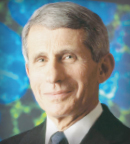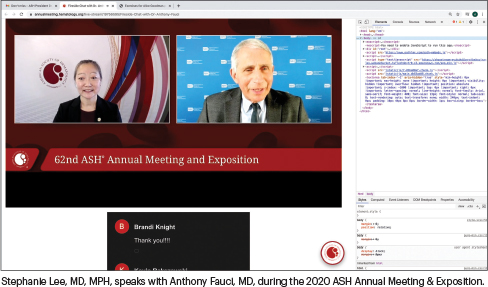
Stephanie Lee, MD, MPH

Anthony Fauci, MD
The American Society of Hematology (ASH) President Stephanie Lee, MD, MPH, sat down with Anthony Fauci, MD, Director of the National Institutes of Allergy and Infectious Diseases (NIAID) and medical advisor to President-Elect Joseph Biden, for a virtual fireside chat about COVID-19 and cancer at the 2020 ASH Annual Meeting & Exposition. Tens of thousands of attendees were logged in, and many typed comments on the side of the screen, heaping praise and gratitude on Dr. Fauci during the conversation.
Here is a summary of the fireside chat.
An Unprecedented Pandemic
Dr. Lee: We want to thank you for your outstanding leadership during this pandemic. COVID-19 is an important topic at this meeting because of the intersection between COVID-19 and hematologic diseases, not only cancer, but associated thrombosis, use of plasma to treat COVID-19, and other factors.
Dr. Fauci, you have served as Director of the National Institute of Allergy and Infectious Diseases (NIAID) for six presidents over 36 years and worked on infectious diseases and other pandemics, many of which have been fought with little public awareness. How is the current pandemic different?
“In less than 1 year, we have seen more morbidity and mortality [with COVID-19] than with any outbreak in 102 years. COVID-19 is totally unique.”— Anthony Fauci, MD
Tweet this quote
Dr. Fauci: There is a similarity in terms of an infection jumping species from animal to human that led to unexpected outbreaks, such as severe acute respiratory syndrome (SARS-1) and Middle East respiratory syndrome (MERS), but that is where the similarity ends. COVID-19 is unprecedented in its impact on the entire world.
I began working at the NIAID during the onset of HIV, a disease with an insidious onset that did not capture attention of the world early on. Rather, HIV was smoldering and was the tip of the iceberg, but it still persists 4 decades later. We have had spectacular success with therapies for that viral infection, but a vaccine continues to elude us.
By contrast, COVID-19 exploded with the first case in China in December of 2019, and then it quickly devastated parts of China. We had our first case in January 2020, and in less than 1 year, we have seen more morbidity and mortality than with any outbreak in 102 years. COVID-19 is totally unique.
We read about the great pandemic of 1918 and wonder what it must have been like to live in that extraordinary time. Now we are living in another extraordinary time, and we are still not near the end of the pandemic. We have record numbers of cases per day, numbers of hospitalizations, and now more than a quarter of a million deaths.
Decades and decades from now, historians will be writing about the pandemic that began in 2019 through 2020 and 2021 and maybe longer.
Duration of Immunity
Dr. Lee: How long do you think immunity will last after clinical infection?
Dr. Fauci: We have to be humble enough to say that we don’t know. We can make reasonable conjectures because it is a coronavirus, and we know about human coronaviruses that are responsible for colds that recur every year. The duration of immunity is measured not in decades or for a lifetime; it is measured more in months to years. People continue to get documented infection with a molecularly identical virus.
We don’t know if that means that when you get SARS–CoV-2, immunity will be short-lived. If the virus leaves the upper respiratory tract, it will likely induce longer immunity. We can wave our hands all we want; the proof of the pudding will be experience months and years from now.
“We need to change the discussion from ‘Should I get it [COVID-19 vaccine]’ to ‘When can I get it.’”— Stephanie Lee, MD, MPH
Tweet this quote
We don’t know how long this vaccine immunity will last. Will it be lifelong like measles, 10 years like tetanus boosts, or 1 year like influenza boosts?
Virus Mutations
Dr. Lee: We haven’t seen much about mutations of this virus. What is known about that?
Dr. Fauci: It is an RNA virus, and it will continue to mutate as long as it continues to spread.
So far, it is not more virulent.
It is unusual for a virus that continues to replicate to become more virulent. It becomes more transmissible but not more virulent. If you look at the evolution of a virus, it is believed that the coronaviruses that cause common colds originated millennia ago and caused pandemics.
‘Long-Haulers’
Dr. Lee: People focus a lot on the death rate. but what about “long-haulers?” Approximately 62 million people have recovered. Do people have to worry about prolonged illnesses?
Dr. Fauci: I want to clarify a misperception. The so-called long-hauler is a person who becomes infected, is symptomatic with fever, profound weakness, cough, and never goes to the hospital but is sick over several weeks. Then there are more severely ill hospitalized people who clear the virus and appear to be well from a lab standpoint, but that 25% continue to have symptoms, such as shortness of breath, sleep disturbances, and an inability to concentrate.
The former resembles chronic fatigue and needs to be distinguished from the person who goes to the hospital, develops acute respiratory distress, microthrombi in organs, and infiltrates in the lung that heal with scarring. These people get better virologically, but they have a predisposition for things like arrhythmia due to damage to their organ systems.
“There should be a global program of vaccination. We have at least two incredibly efficacious vaccines that are extraordinarily effective with regard to severe disease.”— Anthony Fauci, MD
Tweet this quote
These two populations are different—people who get really sick and can’t recover quickly are distinct from people who have a hard time recovering. The only way to determine the difference is to do studies—so we are doing our own at NIAID and fund grantees to look at large populations to characterize this symptomatology and find markers. We have a lot to learn.
Educating the Public
Dr. Lee: Are you worried that when vaccines roll out, people will let their guard down prematurely?
Dr. Fauci: It will be months and months until enough people get vaccines to reach the herd immunity umbrella, and you know many people are not convinced to take the vaccine. We are going to have to convince people to take it. The speedy development of vaccines reflects the technologic advancement in platforms and the enormous investment by the government. This accounts for the speed of going from a pathogen first recognized in early January to Emergency Use Authorization (EAU) approval of a vaccine in November or December. This is beyond record-breaking!
We need to educate the public that the process of determining whether a vaccine is safe and efficacious is driven by independent safety monitoring boards that are not beholden to other interests—people who don’t have any skin in the game. Only when these independent experts decide the data show the vaccine is safe and effective will the company use that data to apply for licensing. Even after that, the scientists at the U.S. Food and Drug Administration and its long-standing committees make independent recommendations one way or another.
The public has to know that the process that will hopefully get the vaccine to them is a completely independent and transparent process.
Encouraging Vaccination
Dr. Lee: The perception is that the process was rushed, but in reality it builds upon scientific knowledge. There is a lot of emotion and fear around this issue. We need to change the discussion from ‘Should I get it’ to ‘When can I get it.’
On another topic, we know that our immunocompromised patients with cancer are not study participants. Do we give them a vaccine, even though we don’t know how they will respond?
Dr. Fauci: I think patients with cancer should be encouraged to get the vaccine. They will probably have a lesser degree of immunity. We don’t know now how much immunity we can induce with the vaccine. That is why we argue for healthy people to get vaccinated to develop herd immunity to protect those who are immunocompromised.
Looking Ahead
Dr. Lee: As we think ahead, where will the world be in a couple of years? Can we ever be carefree?
Dr. Fauci: I’m glad that you said ‘a couple of years,’ because it’s not going to be 1 year.
It depends on how we and our global community respond. We have crushed major global outbreaks with vaccines. We did it with smallpox and eradicated it. Polio and measles have been eliminated [with vaccines] in most countries. There is no reason that we can’t do it with COVID-19, but it would require public health measures until we get billions and billions of doses of vaccine to people worldwide, the way we did with polio and measles. Then I think we could go ahead, eat a hot dog at a ballpark or go to a medical conference. I think we can get there if we have equitable and fair distribution of vaccines around the world, not only for the developed world.

There should be a global program of vaccination. We have at least two incredibly efficacious vaccines that are extraordinarily effective with regard to severe disease.
Anticipating the Next Outbreak
Dr. Lee: Thinking back to other outbreaks, don’t novel coronaviruses come up with a rhythmicity every 8 to 10 years? What should we be doing to prevent the next pandemic?
Dr. Fauci: It is not as rhythmical as you suggested. We had a pandemic in 1918, 1957, 1968, and then now.
We are already thinking ahead about a universal coronavirus vaccine. We need to anticipate the next coronavirus outbreak pandemic.
The sequence of coronaviruses in bats is similar to this one. If you look at the phylogenetic tree, there is SARS-1, MERS, SARS-2. It behooves us to think about developing a universal coronavirus vaccine.
We have been negligent about getting support to our local public health services. I’m not sure that will change. I’m a cautious optimist but a realist, and our corporate memory in medicine and public health is really short.
Personal Perspective
Dr. Lee: Turning to the personal, how do you take care of yourself?
Dr. Fauci: You don’t want me to be an example. I focus on what I have to do. I joke with colleagues and my wife that I am old enough to remember when there was no limitation on doctors’ hours, and I wake up every day and pretend I’m an intern in 1968 and get through the day.
The only thing I do [for myself] is try to exercise [walk at least 3 to 4 miles per day], which has kept me healthy. I think exercise diffuses the stress and keeps me going. It takes mostly adrenaline energy to deal with a serious problem like the pandemic; we don’t have time to take a break and refresh. This is a marathon, and we have to keep going.
Dr. Lee: This pandemic has created celebrities out of public health workers, inspiring a whole generation of people.
Dr. Fauci: This is a good thing, not only for people like me who are visible, but for those behind the scenes—scientists who developed the vaccine and the health workers.
DISCLOSURE: Dr. Lee reported no conflicts of interest related to this discussion. Dr. Fauci reported no conflicts of interest.

